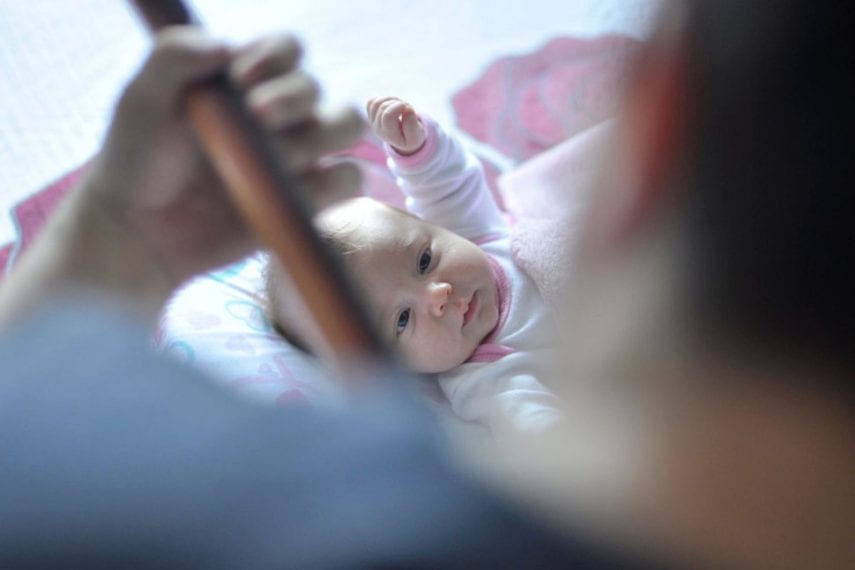Recognizing Perinatal and Postpartum Anxiety Disorder: Beyond the Baby Blues

Postpartum anxiety disorder remains relatively unknown despite the fact that it is much more prevalent than postpartum depression.
“Giving birth to my daughter was the greatest experience of my life,” Susan says, “But after that, all I remember is fear. The 10-minute drive home from the hospital seemed like it would never end and I kept picturing the car crashing. By the time we got to our house I was shaking. I thought, ‘Oh, this is the protective instinct everyone tells you about!’ Once we were home, I became terrified that she would stop breathing in her sleep.
They tell you that when the baby is sleeping, you should be sleeping, but I couldn’t do it. I had to sit right next to her and watch her to make sure she was breathing. So I never slept. I worried she wasn’t getting enough milk so I started expressing and measuring my milk, but then I worried that she wasn’t getting the benefits of skin-on-skin contact and obsessed over signs that she wasn’t reaching developmental milestones.
I worried that people who came to visit would get her sick so I started refusing visits from family and friends. I even worried that my husband would accidentally hurt her when he was giving her a bath, so I insisted on doing it myself, even when I was so tired I could barely keep my eyes open. Everyone around me could see that something was wrong, but I assumed that what I was feeling was normal. I was being a good mom. It wasn’t until my husband showed me an article about postpartum anxiety that it hit me that this was a problem. I can’t tell you how relieving it was to find out that it didn’t have to be this way.”
Begin Your Recovery Journey.
877-727-4343The Hidden Disorder
While postpartum depression, which affects about 6% of new moms, has received mass media attention in recent years, postpartum anxiety disorder remains relatively unknown despite the fact that it is much more prevalent, affecting approximately 11% of women. Psychologist Jonathan Abramowitz says, “We call postpartum anxiety the hidden disorder because so few moms recognize it and it goes undiagnosed. It hasn’t been discussed or studied much, even though it’s a lot more common than postpartum depression (PPD).” One of the reasons postpartum anxiety often goes undetected is that worry is an overwhelmingly common and natural response to becoming a parent; between the hormonal upheaval of pregnancy, birth, and breastfeeding, lack of sleep, new relationship dynamic with your partner, and having to learn how to care for a new human life, it is normal to worry about whether or not you’re doing everything right. Powerful and often conflicting cultural messages about everything from the ideal labor to parenting approach to work/family balance often serve to exacerbate stress levels. While most women are able to deal with their worries, for some, anxiety becomes a painful, debilitating force that takes over and limits their life. Sarah Allen, a clinical psychologist and director of the Postpartum Depression Alliance of Illinois, says:
Every parent worries that they’re not doing something right … that there’s going to be some harm to this little precious baby that’s so vulnerable and tiny. And that’s normal. But anxiety is when it goes on and on – day in, day out, night in, night out – and there’s no let up. That’s the difference.
Although most anxiety develops after birth, about 30% of women with the condition start experiencing anxious symptoms during pregnancy, called perinatal anxiety. If you have a pre-existing anxiety disorder, you are at heightened risk for developing perinatal and postpartum anxiety, but these conditions can affect women without any history of psychiatric illness.
Perinatal and Postpartum OCD
For some women, perinatal and postpartum anxiety manifest as Obsessive-Compulsive Disorder, a combination of intrusive thoughts and compulsive behaviors undertaken to alleviate those thoughts. Elizabeth van der Beugel’s OCD was triggered early in pregnancy when she realized she may have touched sausages without washing her hands. Her fear of toxoplasmosis, an infection that can cause fetal abnormalities and death, became all-consuming and she soon spent hours washing her hands and disinfecting her kitchen in addition to hours of online research regarding dangers to her unborn child. Perinatal and postpartum OCD differs from the ordinary articulation of the illness in that your obsessions and compulsions center around your child. Even for women who have pre-existing OCD, symptoms that manifest around their children may be particularly distressing. However, as Laura Slater explains, there may be a biological basis for perinatal and postpartum OCD:
Why would a woman be vulnerable to OCD during and directly after pregnancy? Why wouldn’t our bodies be set up, in some sort of genetic, evolutionary sense, to produce the kind of liquid calm that best allows for bonding with a baby and thus survival of the species? It may be, actually, that [perinatal] OCD is a kind of maternal survival mechanism gone a little haywire. Some experts hypothesize that OCD is really a manifestation of ancient grooming and guarding behaviors — two things a mother needs to do — that have slipped their chemical loopholes and are acting in an overamplified fashion.
Research suggests that some women are more sensitive to the powerful biochemical changes that happen during and after pregnancy, putting their natural protective instincts into overdrive and manifesting in a dysfunctional hypervigilance. While fear of environmental sources of harm, such as that experienced by van der Beugel, is a common focus, others are consumed by intrusive thoughts of themselves as the source of harm, which many women mistakenly identify as a sign of postpartum psychosis. However, OCD differs from PPD in a critical way: women with OCD are not at increased risk of hurting their children. In fact, you are fixated on preventing harm. You understand that your thoughts are irrational, maintain a firm grasp on right and wrong, and go out of your way to preserve the safety of your child. As psychologist Kiara Timpano points out, “Moms with postpartum OCD may be the least likely to harm their babies, since their symptoms revolve specifically around not wanting something bad to happen.”
Call for a Free Confidential Assessment.
877-727-4343Anxiety Disorder Treatment During and After Pregnancy
Anxiety disorder can cause deep distress during what should be a joyful time in your life and disrupt your ability to function emotionally and behaviorally. For some, it can even interfere with your ability to bond with your child and cause you to feel ashamed, isolated, and alone; many women worry that their symptoms mean that they are failing in their roles as mothers. In fact, the opposite is true. Mila Oshin says, “[Anxiety disorders are]typified by the extreme lengths mothers go through to protect their children from the perceived threat of harm.” However, left untreated, perinatal and postpartum anxiety can not only produce painful symptoms during and immediately following pregnancy, but become chronic conditions that intrude on your psychological health for years after birth.
Connecting with specialized anxiety disorder treatment is the first step to regaining psychological wellness and finding relief from the pain of constant worrying. Some women with perinatal and postpartum anxiety disorder are reluctant to seek out treatment due to concerns about medication that is incompatible with pregnancy and breastfeeding. However, today there are psychotropic options that are safe to use either during pregnancy or while breastfeeding, allowing you to continue this important nurturing and bonding ritual. While medication is a valuable component to many women’s treatment, intensive psychotherapy, group therapies, and holistic therapies offer significant benefits that augment psychotropic interventions or may allow you to recover without the use of medication. Cognitive Behavioral Therapy, in particular, has been shown to have dramatic benefits for treating perinatal and postpartum anxiety disorder, including OCD, by offering practical guidance to identify triggers and disrupt anxiety, replacing irrational and maladaptive thoughts and behaviors with positive, reality-based alternatives. The relaxation techniques, thought modification, and insight you gain in treatment can be incorporated in your everyday life to ensure your continued success and ability to create the life you want for yourself and your family.
Bridges to Recovery offers comprehensive treatment for people suffering from anxiety disorder, including OCD, in a relaxing, supportive environment. Contact us to learn more about our program and how we can help you or your loved one.






